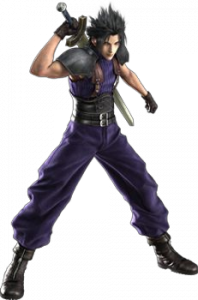It still kind of amazes me that after over ten years Final Fantasy VII is not only still reasonably popular, but that it’s getting spinoffs, sequels, and prequels. I recently had the chance to sit down and play one of these prequels that kind of tries to flesh out some of the events that happened before Final Fantasy VII started.
If you probed all of the crannies in Final Fantasy VII you would have probably gotten a cutscene that showed this mysterious Zack character that Cloud ended up emulating for the majority of that game. And if you didn’t, well, here it is.
There’s a little more to it than that, and if you didn’t play Final Fantasy VII, most of that probably wouldn’t make any sense to you. Heck, even if you did play Final Fantasy VII that might not make that much sense. The game was full of crap that I didn’t really understand.
But that just makes Zack more mysterious, I guess. We never really learn that much about him or his motivations or anything. And that is probably why fans of the game are so ga-ga over him, because of his rugged good looks (hee!) and his mysterious past. And, keeping with the tradition of the tradition of Final Fantasy VII, he has a real big sword.
And that’s where Crisis Core comes in. It takes place several years before the events in Final Fantasy VII take place, and throughout the game we learn a little bit about some of the principal players in that game.
You do this chiefly by running around and fighting things. In fact, I’d say that I spent upwards of 80% of my time in the game inside one battle or another. And it’s always you, as Zack, taking on throngs of enemies by yourself. You do this by directly controlling Zack as he runs around the field, jockeying for position and trying to KO whatever enemies pop up. This is actually quite the departure from other Final Fantasy games where you just kind of put commands into a menu-based system and let your guys just fight it out whle you take on the role of ‘team manager’.
Also in the battles is this thing called the DMW. It kind of looks like a slot machine in the corner and it constantly spins. Match up three portraits of the same character and you do a limit break (some kind of super-attack), further, match three sevens and you level up. Other combinations of portraits and numbers will make lots more stuff happen, but it’s not really anything that you can directly control, so what that means is that lots of random stuff will happen while you’re fighting.
As far as story goes, I won’t really go into it, since it’s pretty much all spoilers. But, it’s really kind of short. I was able to blow through the story in about a dozen hours. But there’s a ridiculous amount of ‘missions’, which are mostly just a set of scenarios that you’re presented with, and usually ends up with you killing a bunch of monsters, or a really powerful monster, or finding some item, or crap like that. I spent another half-dozen or so hours doing missions and barely made a dent in them. It kind of seemed odd to me that you can more than triple the length of the game by doing optional side missions, but there you go.
I enjoyed this game about as much as I did its progenitor. But I can’t help but thinking that I missed out on a lot of the story. I didn’t miss seeing it, I just don’t think I understood it all. There was just a little to obtuse and convoluted for my tastes. I’m sure there was a lot of subtext that I missed. But in spite of that, it was a pretty good time, so I suppose it balances out.

I need to finish playing this game. I have always suspected that FFVII and its related media have suffered from translation difficulty, which might account for some of its obtuseness.
I think you’re exactly right. And the way that they put crucial story elements in optional and hard-to-get-to cutscenes makes me think that they were being obtuse where they meant to be mysterious.